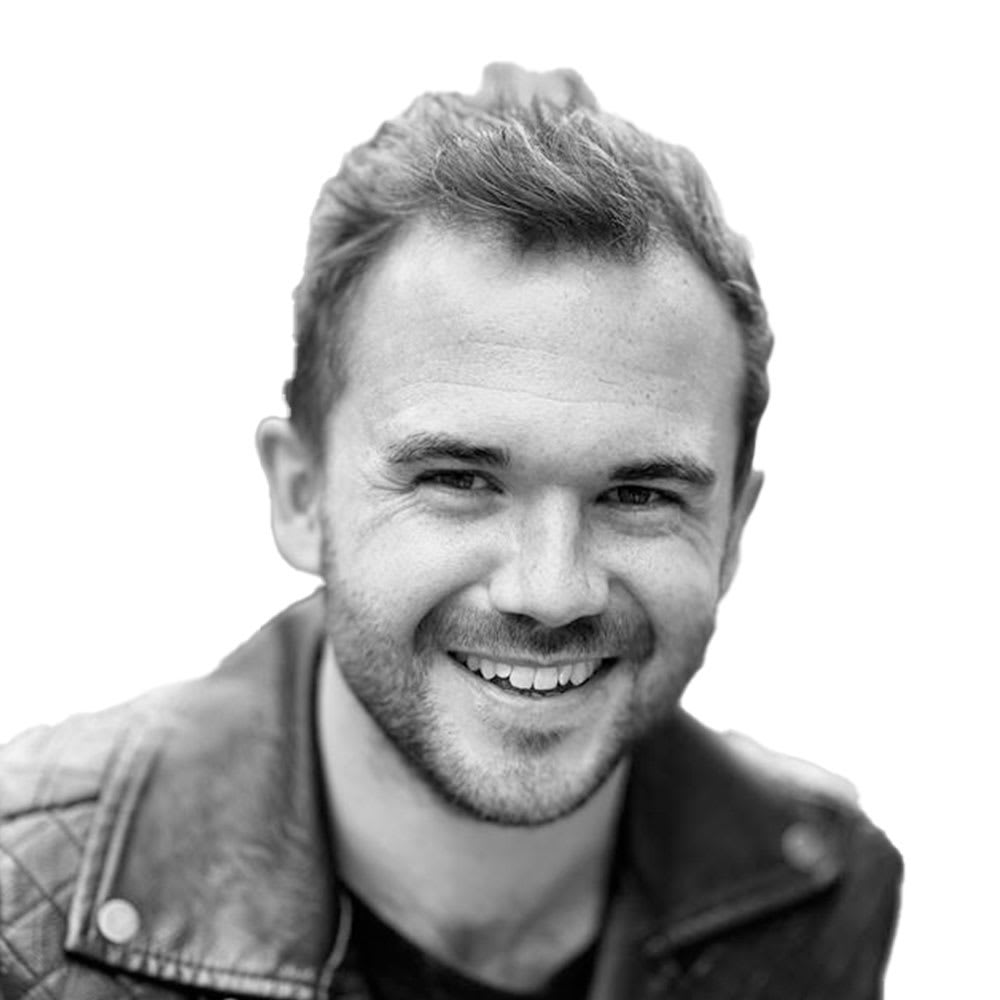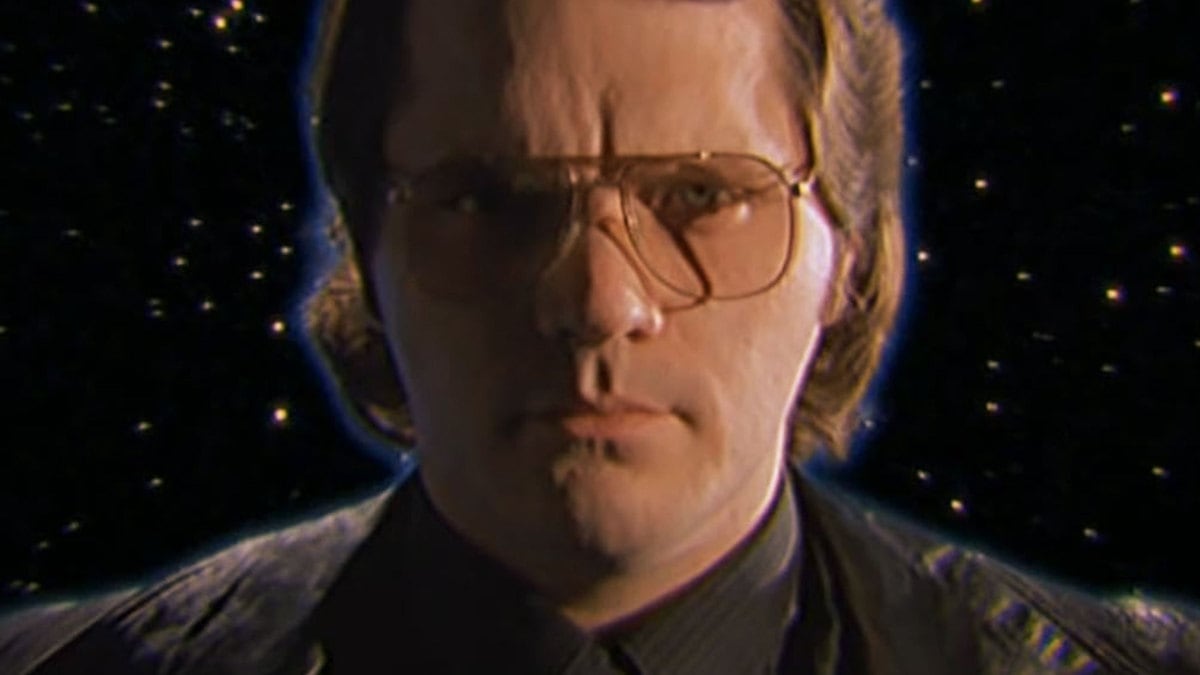Garth Marenghi’s Darkplace may have only run for a single, six-episode season but that hasn’t stopped it from becoming one of the most enduring cult comedies of the past two decades. Airing on U.K. broadcaster Channel 4 in 2004, its highly quotable line deliveries and schlocky horror-parody plots quickly garnered a dedicated fan base, if not much commercial success. While it was too meta to land with the mainstream, the comedy fans who fell for Darkplace still hype it up at every chance—even big-name stars like Paul Rudd and Jon Hamm have called themselves Darkplace die-hards.
Watching the show years later, it’s easy to see why: This is one of the all-time great, weird, idiosyncratic comedies of our time.
Comedian and author Matthew Holness played Garth Marenghi, a leather jacket-wearing, holier-than-thou fictional horror writer who proudly claims to have “written more books than he’s read.” Together with fellow comic Richard Ayoade playing his sleazy, cigar-smoking publisher Dean Lerner and future Darkplace series star Alice Lowe, the trio found success with Marenghi at the Edinburgh Fringe Festival in the late 1990s, bagging the event’s top comedy award in 2001. Eventually, Channel 4 came calling.

The result was Garth Marenghi’s Darkplace. The premise: Marenghi presents a rare glimpse of a fictional show-within-the-show, which he calls his “lost masterpiece.” A lo-fi hospital drama full of bad acting, terrible dubbing, and plenty of filmmaking mistakes, it was supposedly made in the 1980s on a shoestring budget only to be shelved by the powers-that-be for being too risqué.
Marenghi plays Dr. Rick Dagless, the hotshot doc at Darkplace Hospital where otherworldly events are a dime a dozen. Together, with frequently overdubbed stud Dr. Lucien Sanchez (Berry), psychic new recruit Dr. Liz Asher (Lowe), and stiff hospital boss Thornton Reed (Ayoade), Marenghi must protect the hospital from all manner of evil, including a portal to hell, a demonic eye baby, and a sinister mist that turns everyone it touches Scottish.
Interspersed between the clips are talking head interviews with his fellow (fictional) actors. In these improvised segments, Marenghi not-so-humbly dissects the merits of his own work with Lerner, while star Todd Rivers, who plays Sanchez, ponders what really happened to Madeline Wool (Lowe), the actress who played Dr. Liz Asher and then mysteriously disappeared after filming wrapped.
In the years since the show ended, Darkplace continues to enjoy a cult audience across the world. Adult Swim reran the show in the early 2010s, and the increasingly high profile of some of its alums, like Ayoade and Berry, renewed interest in the show. Holness even resurrected the character and released two new Marenghi horror books to great success in recent years, including TerrorTome in 2022 and its 2023 follow-up Incarcerat. The show is also now streaming on Peacock, making it more accessible than ever.
As the series turns 20, we spoke to Holness, Marenghi’s real-life alter ego, about making one of the finest cult comedies of the 21st century.
This interview has been edited and condensed for clarity.
When did talks of making a Garth Marenghi TV show first start?
[Richard Ayoade and I] always wanted to do it. I first did the character in 1995 as part of the Cambridge Footlights Review, and we all had rather lofty ambitions. We all wanted television careers and in those days the perceived wisdom was to go to the Edinburgh Fringe Festival and try out your stuff there because that was where all the TV executives would go to look at new comedy so that’s what we did. We were fortunate enough to have two successful years in Edinburgh, and as a result, we got TV interest.
Were you apprehensive about bringing the character to TV?
Not really. We all felt fairly well-versed in TV and film. My big inspirations were things like The Young Ones and Monty Python’s Flying Circus. The good thing about those shows is they experimented with TV. These days, it’s pretty much prescribed how you do a program and everything against the norm is edited out very early. All the people I admired had used [their own TV shows] to muck around with the medium, which is what we did as well.
Was it immediately clear what type of world you wanted to create for the show?
I think so. Once the pilot had been approved, we had about a week to write each episode so it was a bit high pressure. We shot the pilot [to be set in the modern day]. The idea was to make it so serious that it was just terribly pretentious but actually, it just turned out quite dull. As a result, [Richard Ayoade and I] changed it considerably and decided to set it in the ’80s which allowed us to do all the silly Doctor Who production value jokes.
What kinds of shows and movies inspired you while you were making the show?
Endless horror from various decades. [Richard Ayoade and I] were obsessed with John Carpenter’s In the Mouth of Madness. We watched a lot of Lars Von Trier’s The Kingdom, and I watched a load of Dark Shadows. Weirdly enough, Stephen King’s Kingdom Hospital came out at exactly the same time, but we had no idea when we were making Darkplace.

Darkplace gave Matt Berry his first major TV role. How did he get involved with the show?
The Mighty Boosh had a residency at the Hen and Chickens comedy club in Islington, and that’s where we met Matt. He had this very funny voice and quite a strange delivery, so we knew he’d be perfect, because he could do that bad ’80s acting. We had a bit of a battle convincing Channel 4 to cast him, because, like us, he was an unknown. They didn’t know who he was, so they were a bit hesitant. But we insisted.
In terms of writing him a role, he fit that Templeton Peck [Dirk Benedict’s ‘Faceman’ character from The A-Team] figure of the ’80s. We thought, “He’s got to be the right-hand man”—the guy who would get all the girls, the handsome guy in the team. Nearly every ’80s Vietnam War film I watched had a character called Sanchez, so I thought that was the perfect surname.
The entire cast was very talented. Did Matt and Alice bring a lot to their characters?
Oh definitely. Alice was in the live shows and was brilliant. She’d do all of these very funny visual things and a lot of animal impressions. We thought we’d write that in as part of Liz’s character—that the actress Madeline Wool was very adept at doing animal impressions. She’s very versatile and a great physical comedian.
We realized Matt was very funny with off-the-cuff stuff during dubbing. There’s a bit where he’s being chased by a flying filing cabinet and he says, “Suck on this” when he’s shooting at it. That was improvised by Matt in the sound studio.
You shot on film with presumably a highly trained camera crew. Did you have to tell them to intentionally do a bad job?
Yes, exactly that. We’d get people coming up to us, saying, “You do know that continuity is important…” Then they got into it and would say, “The right way to do this would be like this, but I could do this, and it’d look really off.” We were like, “Yes. Brilliant. Do that.”
The actors’ talking heads felt like improv. Were they?
Most of it was off-the-cuff, to be perfectly honest. There were a few lines that we already had in mind, but most of that stuff was made up on the spot. Matt was particularly good at it. Alice wasn’t in these, which is a shame. I wish we’d included her, but we had that storyline about Madeline’s death, so that ruled it out. I would’ve liked to have seen what Madeline said.
Darkplace has plenty of weird moments. Was there anything that Channel 4 said you couldn’t do?
Channel 4 really wanted us to up the swearing, and we said we’d rather not have any swearing in it. That was the biggest battle.
Why did they want more swearing?
If I remember correctly, Channel 4, at the time, contractually required all shows to contain an element of “edge.” Over 24 percent of a given show had to be technically and/or ideologically “edgy,” while 35 percent of wider entertainment programming had to meet a more long-term contractual stipulation of “morally questionable in a civilized society.” These days, that “edge” requirement has thankfully fallen to a low 4 percent quota across all content media, leaving the remaining 25 percent to be filled with a more viewer-friendly “false” or “tired” edge component. If I remember correctly. [Ed. note: These claims are both unverified and, more importantly, tongue-in-cheek—although Channel 4 did once pride itself as the U.K.’s “edgy” network.]
What was the initial reaction to the show when it aired?
It was quite a depressing feeling, because we had no good feedback at all really. I don’t think we got a sense that there was a following for the show until we got a DVD out many years later. Once that was out, we saw that there were lots of people buying it and coming to the signings but certainly, when the show first went out, it was a pretty muted response. We felt like we’d put all of that effort in but it wasn’t a hit. The stuff that was around back then was very broad, garish, loud and brash. It was only when it got pirated on YouTube that we actually found an audience.
Was there ever talk of doing a second season?
We did try to do a second one, but, unfortunately, Channel 4 was quite adamant that it wasn’t working. They were nice enough to say they wanted something else from us, but we weren’t firing on all cylinders. I think it was largely because it was so disappointing to Richard and I that we couldn’t carry on with the show we wanted to make. We ended up doing Man to Man with Dean Lerner which was essentially a very old-fashioned show that should’ve been made before Darkplace. It was quite disappointing. We came up with a series of ideas, but they were scotched.
I heard that Dagless’ twin brother would have appeared in Season 2.
Yeah. The idea was that everyone was going to play the sibling of their character who had died so Dagless’s brother came in, Dean’s brother, Madeline’s sister, Todd’s brother… all trying to avenge their sibling’s death. I think that would’ve been quite funny.
There was also talk of a Garth Marenghi film…
Some guy ran up to me in the street and said, “You do Garth Marenghi, don’t you? Are you working on a film by any chance?” I said, “Yeah, we’re working on a film script” and he said, “OK. Nice to meet you. Bye!” The next day, it became a news article.
We did write a script, but we didn’t do anything with it. We binned it, because it wasn’t quite working. It was a kind of an Invasion of the Body Snatchers thing with wasps. It was a bit broad and wasn’t quite right.






